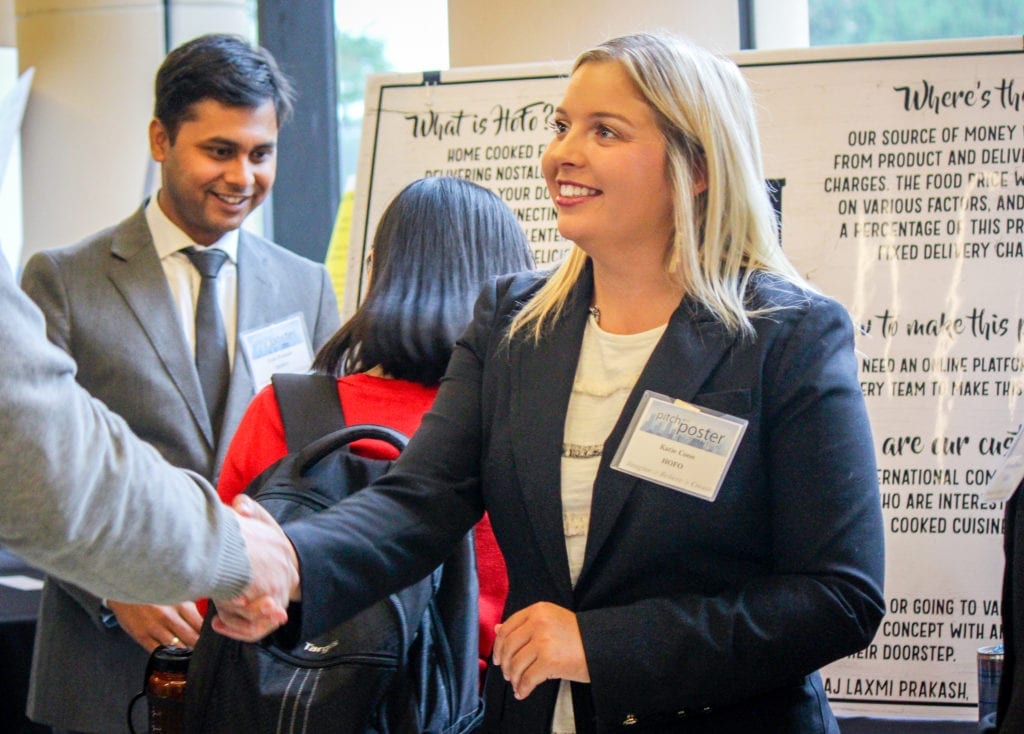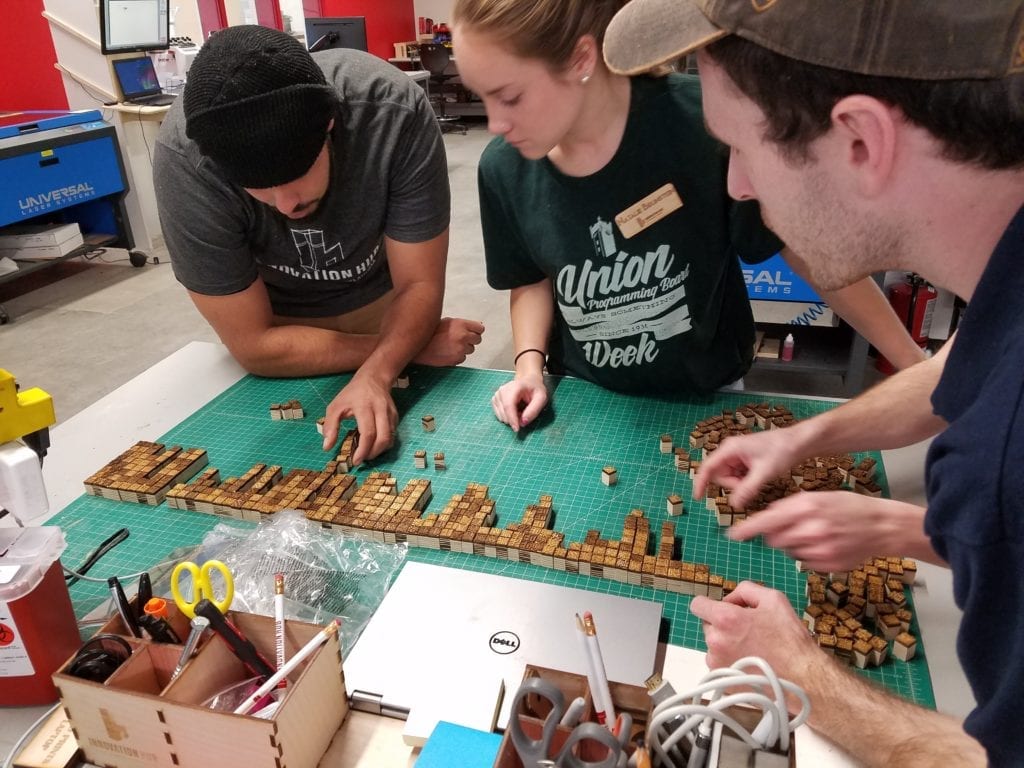Those with a passion for forging unique paths, taking risks or diving into new ventures go by many labels. Mavericks. Pioneers. Individualists. Gamblers. Perhaps the most common umbrella term is entrepreneur, which defines thousands of business owners in Oklahoma. Behind them are various resources to get their dreams off the ground. By utilizing courses and majors at universities, community foundations, local incubators, and private citizens, entrepreneurs can succeed in our state with the right knowledge and experience.
Tools to Succeed
Aspiring entrepreneurs should seek out mentors and look for ways to collaborate with them, say leaders of nonprofits that help fledgling business owners.
“People representing any industry, any idea, any product, anything that is business-related could benefit from being at Oklahoma Venture Forum meetings,” says Kyle Golding, chairman of the board of the Oklahoma City-based nonprofit, which has a monthly luncheon where members “meet each other, network and find ways to work together.”
Golding and his partners own the Golding Group, which provides consulting services to businesses and nonprofits, many of which are startups.
“We were in existence before I found out about the Venture Forum,” Golding says. “I wish I had known about it.”
Devon Laney, president and CEO of 36 Degrees North, calls his nonprofit “Tulsa’s base camp for entrepreneurs. We provide the resources, work space, relationships and education to really help entrepreneurs build and grow.”
Membership levels range from shared workspace or a dedicated desk to three sizes of offices, Laney says. Benefits include free seminars, discounts on business services, attentive assistance from Laney and his staff, and collaboration with peers.
“You are surrounded by other entrepreneurs, and everyone is working hard, trying to figure it out,” Laney says. “Those kinds of conversations are really valuable.”
Tulsa’s Lobeck Taylor Family Foundation also works “to decrease the barriers associated with Tulsans achieving their goals,” CEO Elizabeth Frame Ellison says. “Entrepreneurship is really important because we need more quality jobs in our state, and we need more young people to stay in our state.”
The foundation’s programs include the Mother Road Market, Kitchen 66, Kiva Tulsa and the Tulsa Startup Series.
Mother Road Market, on historic Route 66, comprises 21 businesses that sell food and retail products. The model allows an entrepreneur to test an idea or concept without opening a full-scale restaurant or retail space.
Kitchen 66, housed at same location, offers commercial kitchen space, business training (such as the Launch Program) and sales opportunities through the café and general store at Mother Road Market. Since 2016, it has helped more than 125 food entrepreneurs, including immigrants from 10 countries. More than half have been women.
Kiva.org is a crowdfunding platform designed to alleviate poverty.
“One of the reasons we brought Kiva to Tulsa [in 2017] is that it’s a lot harder for women and people of color to have access to capital,” Ellison says.
The Lobeck Taylor foundation partners with Kiva Tulsa to offer zero-interest loans of up to $10,000 and with the Oklahoma State University Riata Center for Entrepreneurship in the Tulsa Startup Series, which has generated more than 2,300 full-time, part-time and contract jobs since 2007.
Ellison looks for coachable people willing to take constructive feedback and tweak their business plans.
“We try not to tell our entrepreneurs what kind of business they should run,” Ellison says. “But in the food space, we might be more excited if a person has an idea for a restaurant Tulsa needs more of.”
Bruce Barringer, head of OSU’s School of Entrepreneurship, celebrates risk-takers who create new products and innovate.
“It’s uncommon that a traditional company would create something new, like an Airbnb or an Uber,” he says. “Small business is the backbone of growth in our economy.”
An entrepreneur must be an optimistic problem-solver willing to admit what he or she doesn’t know, says Laney, adding that “being an entrepreneur is really hard. You are going to make mistakes. It’s very lonely at times. That’s part of why being at an organization like 36 Degrees North helps.”
Entrepreneurship is worth the risk, Golding says.
“I’m pretty happy with where we are,” he says of his company. “We have jobs we love and we enjoy working together.”
Molding
Entrepreneurs
Oklahoma’s colleges and universities, adjusting to the interests of students, offer a variety of resources to help aspiring business owners.
Every year, 5,000 people make use of the Tom Love Innovation Hub at the University of Oklahoma in Norman. It includes a maker lab, a woodshop, a metal shop, virtual reality equipment and other resources for people who have prototypes and want to learn new skills.
“It’s pretty unusual for a university anywhere to offer this kind of space for free,” executive director Tom Wavering says. “Our mission is to increase innovation and entrepreneurship across the university and the state. Anything we do is open to anyone – students, retirees, you name it.”
Experiential learning is a focus at the University of Tulsa, says Larry Wofford, the Davis D. Bovaird endowed chair of entrepreneurship.
“We have a number of projects where our students work with entrepreneurs to help their experiential learning and to help the entrepreneurs,” Wofford says. “A lot of entrepreneurship occurs within businesses by people who are looking to change the way they do business. Many of our students will get into entrepreneurship by joining or buying a company and becoming entrepreneurial and innovative and changing it.”
At OSU, the School of Entrepreneurship is one of eight departments in the Spears School of Business, Barringer says.
“About 225 students are majoring in entrepreneurship, and 150 minors,” he says. “Last semester, 1,200 students took one or more of our classes. We work with students outside the college of business, especially [science, technology, engineering and math] students.”
For those looking elsewhere, Tulsa Community College offers business development classes and Northeastern State University offers an entrepreneurship major.
Road Map to
Starting a Business
The first decision when starting a business is finding a sector you enjoy, says Larry Weatherford, with the Oklahoma district office of the U.S. Small Business Administration. Once your idea is set, the SBA suggests 10 steps that apply to most ventures.
1. Conduct market research. Gather information about potential customers and businesses already operating in your area, and use it to find a competitive advantage for your venture. Methods include surveys, questionnaires and focus groups. “Market research lets you reduce risk even while your business is still just a gleam in your eye,” Weatherford says.
2. Write a business plan. This is the foundation of your business – a map for how to structure, run and grow your new business. You use it to convince people that working for you or investing in your company is a smart choice.
3. Fund the business. Your plan helps you determine how much money you need to start your business. If you don’t have money on hand, which is common, you need to raise it or get the capital from investors.
4. Choose a location. Whether you set up a brick-and-mortar business or launch an online operation, your choices affect taxes, legal requirements and revenue.
5. Choose a structure. The legal structure you choose impacts your business registration requirements, how much you pay in taxes and your personal liability.
6. Choose a name. You want one that reflects your brand and captures the spirit of the company. Make sure the name isn’t already being used or is copyrighted by someone else.
7. Register the business. Make the business and its name legal and protect your brand, the SBA says. If you do business under a name different than your own, you need to register with the federal government and sometimes with your state government.
8. Get federal and state tax IDs. You use your employer identification number for important steps to start and grow your business, like opening a bank account and paying taxes. It’s like a Social Security number for your business. Some states require a tax identification number as well.
9. Apply for licenses and permits. Keep your business running smoothly by staying legally compliant. Licenses and permits vary by industry, state, location and other factors.
10. Open a business bank account. A small-business checking account can help you handle legal, tax and day-to-day issues.
By the Numbers
Oklahoma is home to nearly 400,000 small businesses, which account for 99% of the state’s companies, according to the U.S. Small Business Administration. The SBA defines small businesses as firms with fewer than 500 employees.
Oklahoma small businesses employed 712,582 people in 2016, the most recent year for which the SBA has employment numbers. That represents 52.4% of the private workforce. Firms with fewer than 100 employees have the largest share of small-business employment.
Minority-owned businesses employed more than 90,000 Oklahomans in 2016.
The top small-business employers by industry are health care and social assistance, accommodations and food services, retail trade and construction.
Success Stories
Catherine Ha
The ink was barely dry on their master’s degree diplomas when Catherine Ha and William Booker founded Tulsa-based Babel Analytics, which creates data-driven software integrating technology with health care.
Ha, 25, credits mentorships, team-building and OU’s Love Innovation Hub for her success. She says she started as a collegian on a pre-medicine track, then went for a master’s degree in computer science at OU.
“My ultimate goal was to combine the two,” she says. “Research is a really good way to incorporate new findings to help people.”
One of Babel’s systems helps health-care providers use artificial intelligence to identify people at risk of opioid abuse. Another extracts and summarizes information from medical records “to find out what details are hidden in patient notes,” Ha says.
Babel also has a product that could speed up eye-injury diagnoses, ranging from curious children with laser pointers to military personnel hurt in combat.
Ha says Wavering, the innovation hub’s executive director, helped her learn about governmental research grants, which is how much of Babel has been funded since it began in May.
Ha and Booker finished third in the graduate division of the Love’s Entrepreneur’s Cup, a statewide competition for collegians with business plans.
“We had an MBA student on our team,” she says. “That gave us the … insights of what we needed to pay attention business-wise.”
Ha says she does not necessarily think of Babel Analytics as her life’s work.
“It would be super cool to grow a huge company here in Oklahoma and employ a lot of people,” she says, “but my thought is to take it one step at a time. With a startup, you have to be flexible.”
Piyush Patel
The difference between having ideas and making them real is execution, says Piyush Patel, an Oklahoma City entrepreneur and investor.
“I call them ‘wantapreneurs,’” says Patel, founder of Digital-Tutors, an online company that he sold to Pluralsight in 2014 for $45 million. “I used to be a sixth-grade science teacher and, after that, a college professor. My wife and I started our business with $54.”
Digital-Tutors grew to 42 full-time employees and 500 contractors, Patel says.
“It was profitable the whole 14 years,” he says. “We did it with no investors and no debt. It’s exciting to be part of a journey where you start with nothing and build something. We had 1.5 million customers around the world.”
His company provided online training for 3D animators and digital artists, primarily for the film and gaming industries.
“I had authored six college textbooks, and just seeing how fast they were sold made me realize there might be an opportunity,” Patel says. “But having an education background and not a business background, it was difficult to learn how to run a business.”
He found help from the Entrepreneurs Organization, a nonprofit with chapters in Oklahoma City and Tulsa.
“EO completely changed my life,” Patel says. “I really feel like I shrank my school of hard knocks to a shorter amount of time.”
In 2018, Patel wrote Lead Your Tribe, Love Your Work: An Entrepreneur’s Guide to Creating a Culture that Matters. He gives about 25 keynote addresses a year and mentors other entrepreneurs.
Patel and his wife, Lisa, own Conclusion Wines in California’s Napa Valley and the Angry Scotsman brewery in Oklahoma City and are investors in about a dozen companies.
“Retirement is boring. I tried it for three or four months,” he says, “so I poured myself back into creating and developing.”
the
right spirit
Some of Oklahoma’s successful entrepreneurs and educators discuss character traits needed to start a company.
“A typical entrepreneur is just a little narcissistic, a little overconfident, and a bit paranoid. That hot mess creates success.” – Piyush Patel, entrepreneur and investor
“One of the things we look for is hustle – somebody really willing to work hard for their business.” – Elizabeth Frame Ellison, CEO of Lobeck Taylor Foundation
“Here in Tulsa, we have a wide range of restaurants and bars that are just nice places to go and spend some time. A lot of young people are starting them. They are realizing they don’t have to have gray hair to get into business.” – Larry Wofford, Davis D. Bovaird endowed chair of entrepreneurship, University of Tulsa
“There’s no singular way to run a business correctly. You have to be flexible, adaptable and open to utilizing your opportunities.” – Kyle Golding, chairman of the board, Oklahoma Venture Forum




























